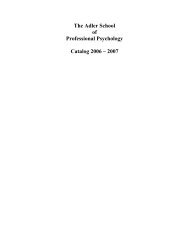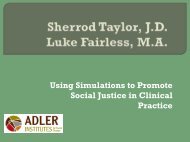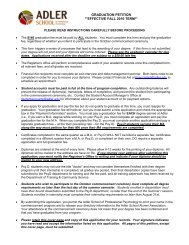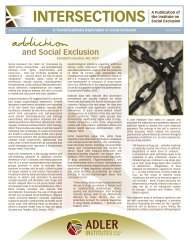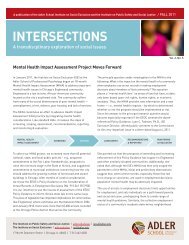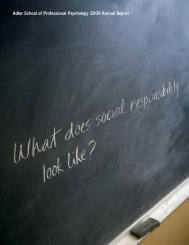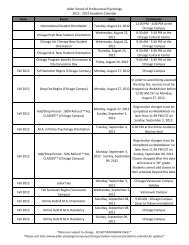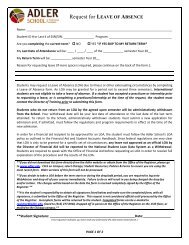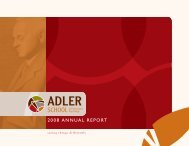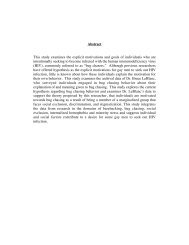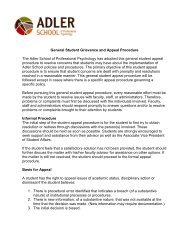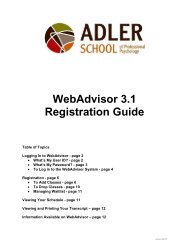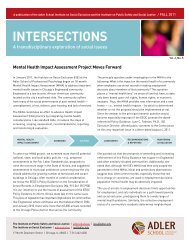Adler School of Professional Psychology Catalog 2008 – 2009
Adler School of Professional Psychology Catalog 2008 – 2009
Adler School of Professional Psychology Catalog 2008 – 2009
You also want an ePaper? Increase the reach of your titles
YUMPU automatically turns print PDFs into web optimized ePapers that Google loves.
populations, the economically disadvantaged, the oppressed, veterans, children<br />
and adolescents, women, and HIV-positive clients are discussed.<br />
437 Treatment <strong>of</strong> Addictive Disorders 3 Credits<br />
Prerequisite: 438. This course will focus on the core functions <strong>of</strong> the alcohol and<br />
other drug counselor. Clinical concepts, terminology, and treatment modalities<br />
including group, individual, couple, and family counseling techniques are<br />
reviewed. The importance <strong>of</strong> the clinical continuum <strong>of</strong> care is discussed with<br />
additional emphasis on prevention, intervention, treatment and aftercare. Other<br />
topics relevant to the ATOD counselor from the treatment perspective, ethical<br />
practices, and legal aspects are presented.<br />
438 Introduction to Addictive Disorders 3 Credits<br />
This course is designed to provide an introduction to alcoholism, substance<br />
abuse, and other addictive disorders. Included is an overview <strong>of</strong> the information<br />
needed to assess along with the treatment models <strong>of</strong> addictive disorders, and<br />
provide the tool to be able to recognize the signs and symptoms <strong>of</strong> substance<br />
use, misuse, abuse, dependence, dual disorders, and the mentally ill substance<br />
abusers (MISA). The understanding <strong>of</strong> the basic pharmacological, physiological,<br />
and medical aspects <strong>of</strong> chemical dependence will be included along with the<br />
historic development <strong>of</strong> alcohol and other drug usage, self help groups, and<br />
treatment delivery systems.<br />
445-446 Practicum in Substance Abuse Counseling I-II 1 Credit per term<br />
Prerequisites: 611-613 or M.A. program practicum 506-507 or 480-481 or 587<br />
+ 590 or 664-665, Approval <strong>of</strong> Program Coordinator and Direct <strong>of</strong> Training and<br />
Community Service, concurrent with practicum seminar 447-448. Students are<br />
involved in an approved field placement experience to integrate knowledge<br />
and skills in a clinical setting. Students are required to spend 300 clock hours<br />
per practicum (a minimum <strong>of</strong> 700 total clock hours) in a supervised<br />
field experience.<br />
447-448 M.A. Practicum Seminar 1 Credit per term<br />
in Substance Abuse Counseling I-II<br />
Prerequisite: Concurrent with Practica (445 and 446). This course is designed<br />
to develop alcohol and other drug counseling skills concurrent with practicum<br />
field experiences. A group supervision model provides the student with the<br />
opportunity to apply previously learned concepts while working in an outside<br />
field experience. Emphasis is on written and oral case presentations in the areas<br />
<strong>of</strong> counseling skills, intake assessment, treatment planning and case<br />
management. Students are expected to recognize pr<strong>of</strong>essional and legal<br />
considerations relevant to ethics, confidentiality, working with referral sources,<br />
special populations, treatment options, and models <strong>of</strong> alcohol and drug<br />
counseling.<br />
114



